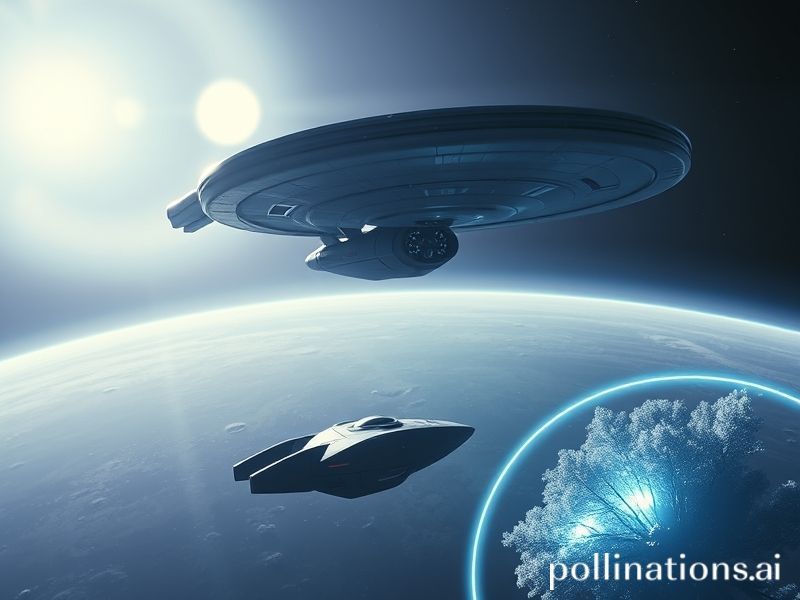Galaxy-Brained Diplomacy: How Star Trek: Strange New Worlds Became the World’s Favorite Escape From Earth
Star Trek: Strange New Worlds and the Mirage of Multilateral Hope
By Our Man in Geneva, nursing a lukewarm espresso and an even colder view of humanity
Somewhere between the drone of the UN Human Rights Council’s afternoon session and the faint smell of over-boiled cafeteria broccoli, I found myself streaming the latest episode of Star Trek: Strange New Worlds on a cracked iPad balanced atop a stack of non-binding climate accords. The irony was not lost on me: here was Captain Christopher Pike—chiseled jaw, perfect teeth, and the moral clarity of a man who has never had to negotiate with a Hungarian veto—calmly preventing interstellar genocide while downstairs delegates were locked in a four-hour procedural haggle over the placement of a comma in Paragraph 19(b).
To the rest of the planet, Strange New Worlds is just another glossy export from the American entertainment-industrial complex, available in 190-odd territories via Paramount+ and the ever-reliable pirate sites of international solidarity. Yet beneath the lens flares and retro-cool title cards lies a curiously subversive artifact: a future where Earth has apparently solved nationalism, income inequality, and—most miraculous of all—Twitter. Watching it on five different continents, viewers from Lagos to Lahore are invited to imagine a United Federation of Planets that functions suspiciously better than our own United Nations. The series streams simultaneously in 4K from Singapore servers and in grainy 480p across rural Bolivia, creating a two-tiered experience that neatly mirrors global broadband apartheid.
Internationally, the show’s real product isn’t nostalgia for 1960s optimism; it’s the export of a very American coping mechanism. While European parliaments bicker over whether to send tanks or just strongly worded postcards to Ukraine, Strange New Worlds air-drops photon torpedoes and ethical certainty into living rooms that haven’t seen certainty since the last World Cup. In Seoul, a graduate student binge-watches on the subway and wonders why the Klingon Empire can pivot to renewable energy faster than South Korea can shut down a coal plant. In São Paulo, a favela streamer overlays Portuguese subtitles that translate “warp core breach” as “bolsonarismo,” because some metaphors write themselves.
Critics on three continents have pointed out that the Enterprise’s crew, for all its talk of infinite diversity, still speaks with a suspiciously Californian cadence. This linguistic monoculture is less a failure of imagination than a geopolitical reality: when your streaming royalties are denominated in dollars, even the universal translator gets an American accent. Meanwhile, China’s censors trim four seconds of a same-gender kiss, proving once again that in space no one can hear you virtue-signal—unless Beijing’s State Administration of Radio and Film is listening.
The broader significance? Strange New Worlds is less a roadmap to the 23rd century than a fun-house mirror for the 21st. Each planet-of-the-week dilemma—climate collapse, AI rights, sectarian violence—maps neatly onto current headlines, allowing viewers to rehearse moral clarity at a safe 200-light-year remove. It’s geopolitical escapism with a Starfleet badge: we can all clap when Pike refuses to let refugees drown in space, then look up and realize the Mediterranean is still open for business.
Ratings data, leaked from an internal Paramount+ slide deck that somehow smelled of truffle oil and desperation, show the series’ fastest growth in India and Nigeria—markets where young audiences apparently prefer their post-scarcity socialism with a side of retro-futurist eye candy. Advertisers, ever the true explorers of strange new worlds, have taken note: expect next season’s Enterprise corridors to feature discreetly placed holographic billboards for whatever cryptocurrency is currently collapsing.
As the credits rolled and the iPad battery coughed its last 3%, I glanced at the Palais des Nations across the street. Inside, delegates were still arguing over the comma. Somewhere on the Enterprise, Spock was teaching a junior officer that logic without compassion is just arithmetic. I closed the tablet, walked back into the plenary, and wondered—not for the first time—whether our entire species is stuck in the transporter buffer, half-formed, waiting for a better script.
Until then, we’ll keep streaming the fantasy, one subtitled morality play at a time. After all, hope sells—especially when bundled with a monthly subscription and a free trial of utopia.







